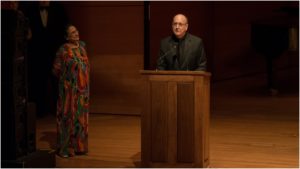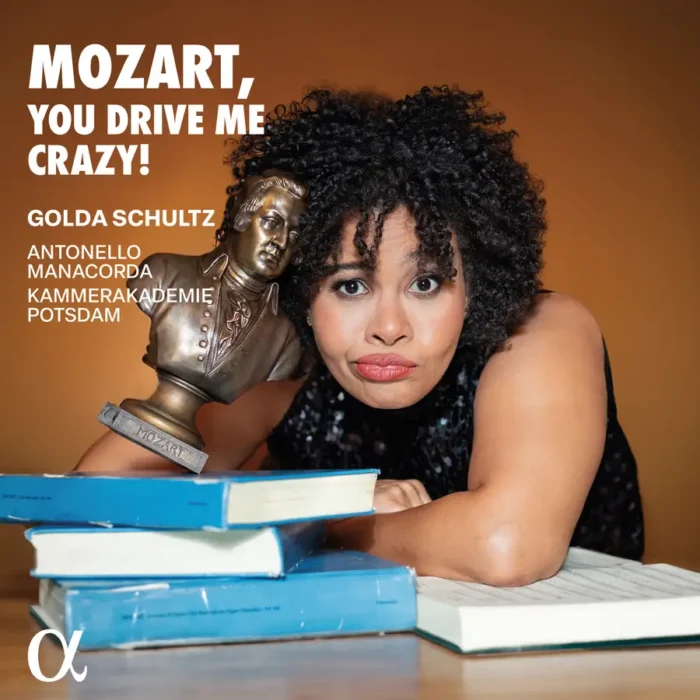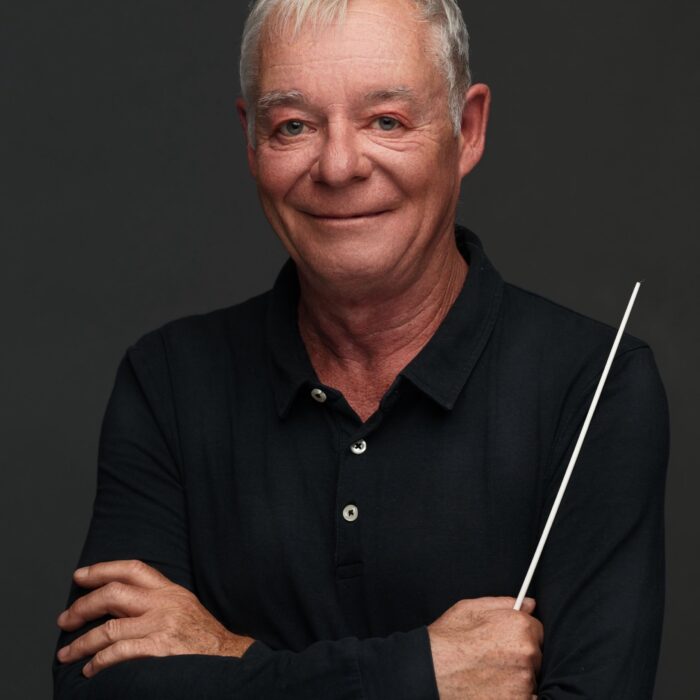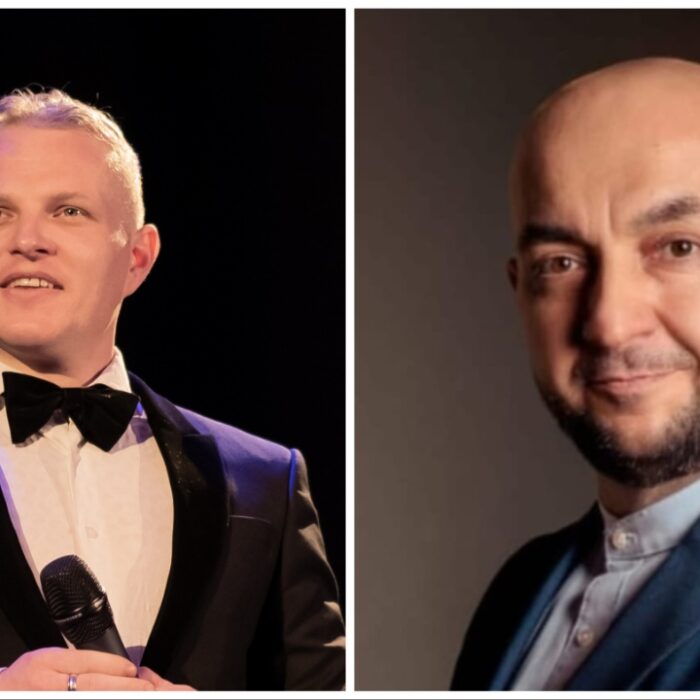
Peter Gelb Honored at Young Concert Artists Gala Concert
By Logan MartellOn May 1, audiences gathered at Lincoln Center’s Alice Tully Hall for the 57th Young Concert Artists Concert. The evening was in celebration not only of the tireless practice and work put in by the performers, but for Metropolitan Opera’s General Manager, Peter Gelb. After the opening remarks, Gelb was presented with his award before delivering his acceptance speech, which bore volumes of reflection pointed with the kind of humor that can only come from years in service to one of the foremost opera houses in the world.
Here is Gelb’s statement.
“When I signed my contract to become the 16th General Manager in the illustrious history of the Metropolitan,“ began Gelb, “it included a clause, and it still does, that I have to be available 24/7 since you never know what might happen in the daily and nightly events of the busiest and sometimes wackiest performing arts company. In reaction to our new production of ‘Cosi fan Tutte,’ set in Coney Island in the 50s, with real-life circus performers, including sword-swallowers, fire-breathers, and even a snake charmer, one of our stage managers said ‘I always felt the Met is a circus, now it really has become one.’ While I’m having my brief respite here, with you, I’m able to retreat from what I normally worry about in the course of a season which runs from September to May: hypochondriac singers; the ever present danger of snow cancellations as the Governor and Mayor fight to see who can shut the city down first; misguided individuals who think the orchestra pit is where they should deposit the ashes of their loved ones; ex-music directors who are suing instead of apologizing; the decline of the mainstream media, and the few remaining music critics who comprehend little and complain often; people who think there has been nothing good on the Metropolitan stage since Zeffirelli; and the decades-long absence of arts education in schools, making it more challenging than ever to attract new audiences; just to mention a few of my concerns.
“This season has had its off-stage crises, but we’ve grown used to crisis management at the Met. An anti-Ukrainian separatist jumped on the stage to protest Anna Netrebko, who was performing in Tchaikovsky’s ‘Iolanta,’while outside the opera house, other protestors held up a poster depicting me as a monkey on a leash held by Putin. Who would have known that current White House and the Met have something in common?” he continued.
“We are dedicated to stimulating audiences to keep attending and our donors to keep giving. As we know, operas are long, in foreign languages, and mostly from the 18th, 19th, and early 20th centuries, providing the basis for our basic repertoire. Where would any major opera company be without Wagner, Mozart, Strauss, Puccini, Verdi, and Rossini? With the basic repertoire largely set, although we are certainly attempting to show new works, it becomes difficult for an established audience to accept change. Yet change is essential in order to achieve artistic renewal” Gelb added. “Without change in the form of new productions and new works, we cannot attract new audiences. On the other hand, music critics have become jaded by the repeating repertoire and seem to be only occasionally satisfied with new productions or revivals of old productions; although we threaded a needle recently with the critical and public hit that is the aforementioned production of ‘Cosi fan Tutte.’ Our new David McVicar production of ‘Tosca’ currently playing at the Met, premiered earlier this season, set magnificently in the 19th century and Puccini’s prescribed locations, and utilized a dramatically greater stage, was a success with the public. But it also earned admonition from some critics who worried about the trajectory that might represent a dangerously retro reversal of artistic force. What those critics fail to understand is that success in art isn’t produced with an assembly-line approach, where one size fits all. Our artistic goal at the Met is to introduce great work, not only to be true to the composer’s intentions, but not to be limited by period or setting. Each new production we put on our stage should have its own artistic DNA. While we engage with directors of all stripes, such as luminaries like Bartlett Sher, who was today nominated for a Tony Award for ‘My Fair Lady’ next door, and David McVicar… there is one aspect all Met directors have in common: they are first and foremost excellent storytellers who are committed to presenting pure narratives to their audiences. They understand there’s an audience out there with whom they must connect to achieve popular success. The very first production of my tenure at the Met was the late Academy Award-winning Anthony Minghella’s stunning 2006 presentation of ‘Madama Butterfly’… his very first opera, and sadly, his last. One of the critics asked him ‘What are you going to do to ‘Butterfly?” Surprised, Anthony said ‘What do you mean? Nothing, but tell the story.’ And that is just what he did; Which is what good directors do in spite of goading from the critics. As the Nobel Prize-winning playwright Eugene O’Neill once said of his critics: ‘God bless every bone in their heads.'”
“We’re now in the final two weeks of our season, and during the season I feel like a doctor who’s always on-call. In fact, after 12 seasons as General Manager, dealing with the fragile state of tenors and sopranos, I’ve come to realize there are only three stages of health for singers: they’re always catching a cold, suffering from a cold, or recovering from a cold. As the old joke goes: how do you put the sparkle in a tenor’s eyes? You shine a flashlight in his ear. Long before I came to the Met, I thought that I was well-trained in dealing with the challenging demands of artists with complicated personalities. In the 80s, I was the manager of Vladimir Horowitz, who is perhaps the greatest pianist of all time, but would only agree to return to Moscow to perform his starring 1985 concert during the Cold War after I guaranteed, with the help of President Reagan, that his Steinway piano would be kept under 24-hour guard by the U.S. Marine Corp. Along the way, I also picked up practical advice from Horowitz. He taught me to value acoustics; he said ‘if the check is good, the acoustics are good.’ He also taught me to read the menu in an expensive restaurant, from right to left, ‘like Hebrew,’ he said. After 12 years he said to me, ‘I’ve known you so long, you’re like a member of our family. From now on, instead of calling me Mr. Horowitz, I’d like you to call me Maestro.’
“During my tenure at the Met, I haven’t always succeeded. I had a hard lesson in 2009 when we replaced Zeffirelli’s grandiose production of ‘Tosca’ for the first time, with a new, grittier conception by the esteemed French director Luc Bondy. The process of producing a new ‘Ring’ cycle at the Met was one of the most challenging projects of my career. It was not without its share of mishaps, but part of our work at the Met involves taking necessary and calculated creative risks. In the performing arts, adhering to the status quo might be the greatest risk of all. Thank you.”
A Symphonic Celebration
The concert began on a strong note with Tchaikovky’s “Serenade for Strings Op. 48.” Following this was Ernest Chausson’s “Chanson perpetuelle,” performed by Sasha Cooke, Anne-Marie McDermott, and The Zora String Quartet. So caught up was I in Cooke’s rendition that I forgot to even glance at the translation included in the program. The lyrics describe the abyss of distraught felt by an abandoned lover who finds a fatal solace in being reclaimed by the earth; while it may be tempting to overindulge in such emotions, Cooke sang with a refinement that conjured up an entire flood of heartbreak, ready to spill forth at a moment’s notice. The Zora String Quartet carried all this poignancy through the pauses in the text, leaving no chance for the charge in the air to fade as the piece crescendoed into its climactic moment, captured with the phrase “And my breast, trembling under the caress of their entwining, will believe it feels the embrace of the one who is gone.”
As if the preceding numbers weren’t enough to utterly capture one’s attention, what followed next was truly a musical spectacle, performed by pianists Lise de la Salle, Gleb Ivanov, Anne-Marie McDermott, and Yun-Chin Zhou. First in their set was Franz Liszt’s “Hungarian Rhapsody No. 2.” Having recognized the opening chords of the first movement from its appearance in the 1946 Marx Brothers film “A Night in Casablanca,” I knew this would be a fun number and it turned out to be just that as the eights hands flowed from the maestoso into the rapid, almost frantic hammering without missing a beat.
Following this was Scott Joplin’s “Rag Rhapsody,” which saw the two teams switch up their members and drew laughter with a percussive flair in the form of well-timed stomps and claps. Finally, their set concluded with all four pianists sharing the same instrument to perform Albert Lavignac’s “Gallop March,” taking their synchronization to a whole new level. Even more than the technical aspects of their playing, I was delighted by how much fun each pianist appeared to be having during this madcap finale, punctuated with the tossing of pages of sheet music and met with the roaring cheer of the audience.
Categories
News

